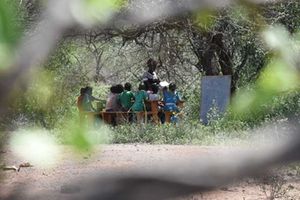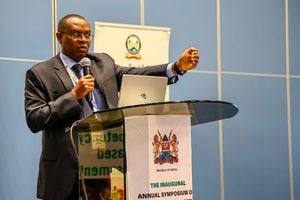
Knec chairperson, Prof Julius Nyabundi, speaks at Knec headquarters in Nairobi during the release of the 2023 KCPE results on November 23, 2023.
Debate on whether mathematics should be an optional subject in senior school under the Competency-Based Curriculum (CBC) raged during a three-day symposium organised by the Kenya National Examinations Council (Knec).
According to data from the council, there has been a worrying trend in performance in mathematics that reveals a significant number of learners complete secondary school without achieving the minimum required competencies in mathematics.
On average, about 15 percent of students transitioning to secondary school struggle with higher-level mathematical concepts due to weak foundational skills acquired in primary school.
The data shows that between 2021 and 2023, the proportion of KCSE candidates attaining the minimum competency level in mathematics, grade D+ and above, ranged from 22 percent to 31 percent, with a notable drop in 2022 to 17.46 percent.
Knec chairperson Prof Julius Nyabundi noted the statistics have reignited debate over whether mathematics should remain a compulsory subject in senior school, where learners will choose career pathways of their preference as well as ability. He was speaking at the symposium on competency-based assessment (CBA)
“A number of issues have emerged – chief among them, whether mathematics should be compulsory,” he said. “There’s a growing appreciation that forcing every learner to take mathematics may not be in the best interest of all students.”
He recalled that during the era of the A-level system, students had the choice to drop mathematics after Form Four, opting instead for arts-based subjects like history, Christian Religious Education (CRE), or literature.
“Even then, mathematics was not mandatory for university admission,” he added.
He added that the CBC has been deliberately structured to ensure that all learners acquire strong foundational skills in mathematics by the end of junior school.
Curriculum
Under CBC, elementary education is divided into pre-primary and primary education, taking two and six years, respectively. Junior starts from Grade Seven up to Grade Nine, while senior starts from Grade 10 to 12.
Grade 9, which marks the final year of junior secondary, closely aligns with the early years of the former 8-4-4 system, during which students typically demonstrated stronger performance in mathematics.

Students of Kagira Mixed Secondary School in Dagoretti South Constituency in class in this picture taken on August 28, 2024.
At senior secondary, focus is on pre-career skills, otherwise referred to as specialisation, where learners engage in lots of projects to prepare them for the world of work.
“At senior school, we will be able to see that apart from just the knowledge you’ve acquired in a given subject, have you also acquired the necessary values?” said Knec chief executive David Njeng’ere.
This year's edition of the symposium organised is themed “Mobilising Assessment Data Usage for Equity in Learning, Instruction and Shaping the Policy Agenda”. It brings together different players in the education sector to discuss various issues and offer mitigation solutions where necessary.
The inaugural symposium was held in April 2024, where participants were updated on ongoing education reforms in Kenya that have led to changes in assessment practices and reporting.












